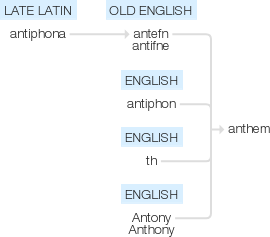Anthem
Old English antefn, antifne (denoting a composition sung antiphonally), from late Latin antiphona (see antiphon). The spelling with th, which began in the 16th century, was on the pattern of similar words such as Antony, Anthony .
wiktionary
From Middle English anteme, from Old English antefn, antefen and Old French antiene, anteine, anteivne, from Latin antiphōna, from Ancient Greek ἀντίφωνα(antíphōna), from ἀντί(antí, “over against”) + φωνή(phōnḗ, “voice, sound”). Doublet of antiphon and ant'em.
etymonline
anthem (n.)
Old English ontemn, antefn, "a composition (in prose or verse) sung in alternate parts," from Late Latin antefana, from Greek antiphona "verse response" (see antiphon).
The sense evolved to "a composition (usually from Scripture) set to sacred music" (late 14c.), then "song of praise or gladness" (1590s). It came to be used in reference to the English national song (technically, as OED points out, a hymn) and extended to those of other nations. Modern spelling is from late 16c., perhaps an attempt to make the word look more Greek.
